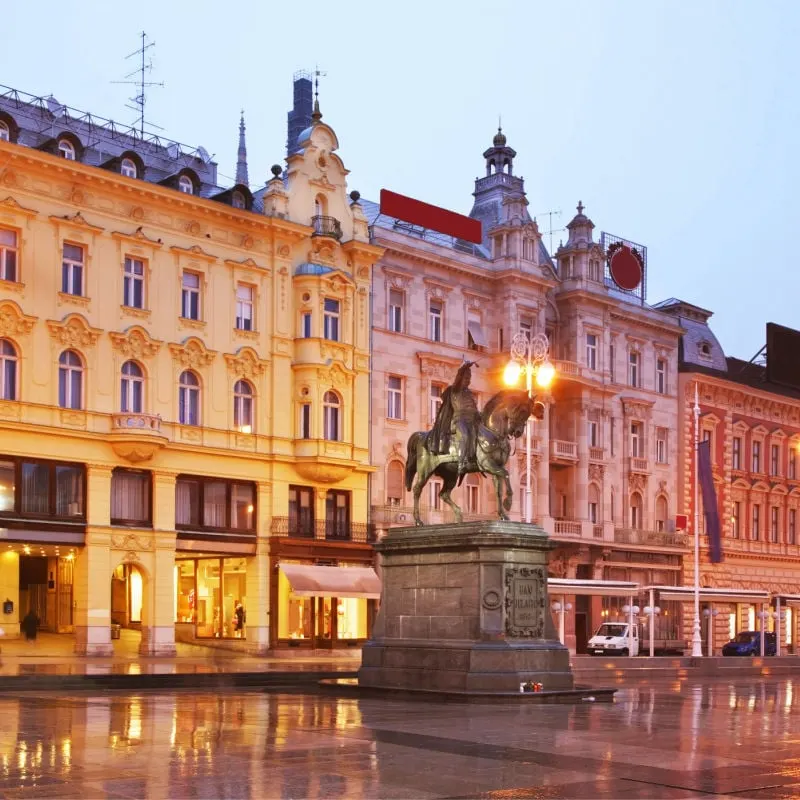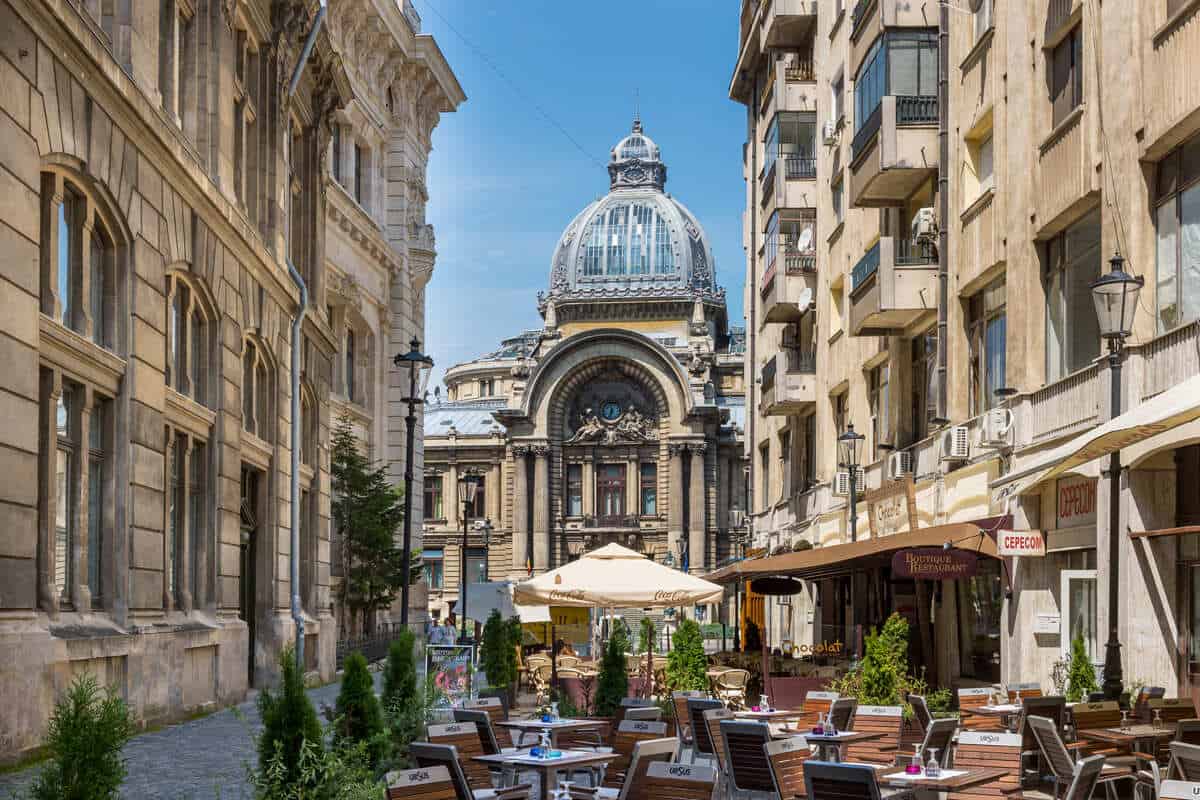With its absence of borders, high levels of safety and development, and unparalleled cultural offer, Europe is still the go-to destination for digital nomads, though the latest surge in prices, particularly in the Eurozone, might have discouraged some from moving across the pond.
While it’s true European countries are getting increasingly expensive, including those that have historically been perceived as ‘affordable’ options, there are still some exciting alternatives left if you’re a remote worker on a budget dreaming of a country-hopping adventure in the Old World.
Basing yourself in any of these four cities, you can live comfortably on less than 2 thousand dollars a month, and with their vast cultural offer, odds are you’ll never get bored:
Bucharest, Romania
The Paris of the East
Average monthly expenses: US$1,945
Average internet speed: 38Mbps
Quality of life: Good
Safety: Good
Liked by 84% of NomadList members
Disliked by 16% of NomadList members

The beating heart and largest urban conurbation in the Eastern European nation of Romania, Bucharest is nicknamed ‘Paris of the East’, though both capitals exist on polar opposites, at least in terms of affordability.
According to NomadList, Bucharest is very affordable, with remote workers based in the city, who are members of the increasingly-popular platform, reporting monthly expenses of US$1,945. This sum might hardly be enough to cover rent/utility bills alone in central New York.
In Bucharest, it is not rare to find well-equipped long-term AirBnB rentals on the market for less than US$700 a month, nor cheap places to eat – lavishly at that – on less than twenty dollars.

Nomads have also reported a higher quality of life upon moving here, highlighting the city’s overall greenery and walkability, the abundance of co-working spots, and the internet speed (38Mbps on average).
As for the Paris comparison, it is mostly attributed to a handful of Haussman-style buildings centered in the cobbled Old Town, so don’t expect Brutalist-ridden Bucharest to carry the same weight of architectural tradition; yet this does not mean it has a shortage of monuments or attractions.
Some of the most iconic landmarks include the huge concrete mass that is the Romanian Parliament, the heaviest building in the world weighing 4.10 million tons, the Arcul de Triumf, Bucharest’s own Paris-style triumphal arc, and the Neoclassical ‘Athenaeum’ concert hall.

Antalya, Turkiye
The Eastern Mediterranean Queen
Average monthly expenses: US$1,518
Average internet speed: 7Mbps
Quality of life: OK
Safety: Good
Liked by 86% of NomadList members
Disliked by 14% of NomadList members

Though it is technically located in Western Asia, the Turkish coastal city of Antalya is generally considered a European hub due to its historical links with the neighboring continent and the locals’ more liberal approach to both religion and life.
The rising star of Turkiye’s Tourism Reinassance, Antalya is an ancient queen best known for its rich Greco-Roman heritage and trendy resort zone.
Back in ancient times, it was one of the most important trading ports in the Eastern Mediterranean, and though you are unlikely to spot Greek traders unloading heavy cargo before Antalya’s fortified seafront in this day and age, strolling its Kaleiçi (Old Town) will certainly feel like traveling back in time.

A maze of romantic cobbled streets, spanned by arching, flowery vines, that either lead to a traditional restaurant housed in a centuries-old Ottoman mansion, or much older Byzantine churches (turned mosque), the Kaleiçi is sure to steal your heart.
For a taste of Antalya’s vibrant modern life, nomads often head to Konyaalti, a development zone with a modern promenade lining the Mediterranean, full of bars, cafes, and leisure centers. It is where the city’s most frequented beach, Konyaalti Plaji, is located.
In the affordability chart, Antalya scores even higher than Bucharest. NomadList members have agreed that US$1,518 is enough for a salary to live reasonably well in the city, though the internet speed appears to be lower at 7Mbps on average.

The safety parameters were ‘good’ as well, and the temperature is ‘perfect’, with highs of 95 Fahrenheit in summer, lows of 59 in the off-season, and sunny days year-round.
Zagreb, Croatia
The Forgotten Habsburg Gem
Average monthly expenses: US$1,489
Average internet speed: 11Mbps
Quality of life: Good
Safety: Great
Liked by 100% of NomadList members
Disliked by 0% of NomadList members

Croatia is one of the busiest summer destinations in Europe, though strangely enough, its capital ranks among some of the least-visited cities. As it is not on the coast and often portrayed in the media as a ‘financial center’, it is often skipped by sun-seekers.
While we could write an entire article on the under-appreciation of Zagreb as a cultural hotspot, we will focus instead on its soaring popularity among digital nomads and slow travelers.
It is brimming with life in this respect, having re-surged from the COVID pandemic a European magnet for remote workers, who are drawn to its numerous work-friendly cafes, lush municipal parks, medieval landmarks, riotous nightlife, and eccentric museums – ever heard of a certain Museum of Broken Relationships?

No, it doesn’t have access to Croatia’s crystal-clear Adriatic, unlike the far more popular sunny getaways of Zadar, Split, or Dubrovnik, but it doesn’t need the ocean to be a great home base in Europe.
This Central European, formerly-Habsburg jewel is awaiting discovery, and there seems to be unanimity among those who have visited, either for a short or long period, with 100% of NomadList members having a positive impression.
They are particularly pleased with the affordability of Zagreb, as earning US$1,489 a month may be enough to cover necessary expenses, the ‘fast’ internet speed (11Mbps), and the lack of crime.

On the downside, it can feel too hot in summer, when temperatures soar above 100 degrees, or too cold in winter, when snow is usually expected, and the LGBTQ+ friendliness indicator is ‘bad’.
Skopje, North Macedonia
The Quirky One
Average monthly expenses: US$1,322
Average internet speed: 9Mbps
Quality of life: OK
Safety: Good
Liked by 71% of NomadList members
Disliked by 29% of NomadList members

The least-expensive entry on this list, Skopje is the quirky capital of North Macedonia, a country that’s changed name more times than we can count in the last two decades.
As one of our writers and collaborators has described herself in this article, it is simply ‘ideal’ for digital nomads, ticking all of the boxes on the nomad checklist:
- It is not crowded, like, at all
- Prices are shockingly cheap
- The nomad scene is booming
- Safety levels are ok
- It is well-connected to other European cities
- Mass tourism is yet to ruin it
In fact, Skopje is still one of the least-visited capitals in Europe, and we honestly cannot fathom why.

Its medieval historic center is incredibly picturesque, with Ottoman-style bazaars and cobbled paths that lead up to an imposing hilltop fortress. Across the Vardar River, the main public square, aptly-named Macedonia Square, houses a monumental statue of Alexander the Great.
It’s been dubbed the ‘Balkan Times Square’ due to the digital screens and large billboards that surround it, and it certainly lives up to its title (though the surrounding buildings may look somewhat more dilapidated or in need of renovation).
All in all, Skopje is perhaps the most underdeveloped city to feature here.
It is one of several Balkan countries that remain outside the European Union, and poverty rates in North Macedonia are higher than in more well-off European states.

That’s not to say it lacks charm or that it should be ignored.
If anything, it means there is a lot of unexplored potential and room to grow; unlike in other over-crowded capitals where young entrepreneurs are leaving in droves due to the prohibitive cost of living.
In Skopje, the quality of life is just ‘ok,’ but it excels in affordability (US$1,322 per month), temperate weather, and a high perception of safety.

